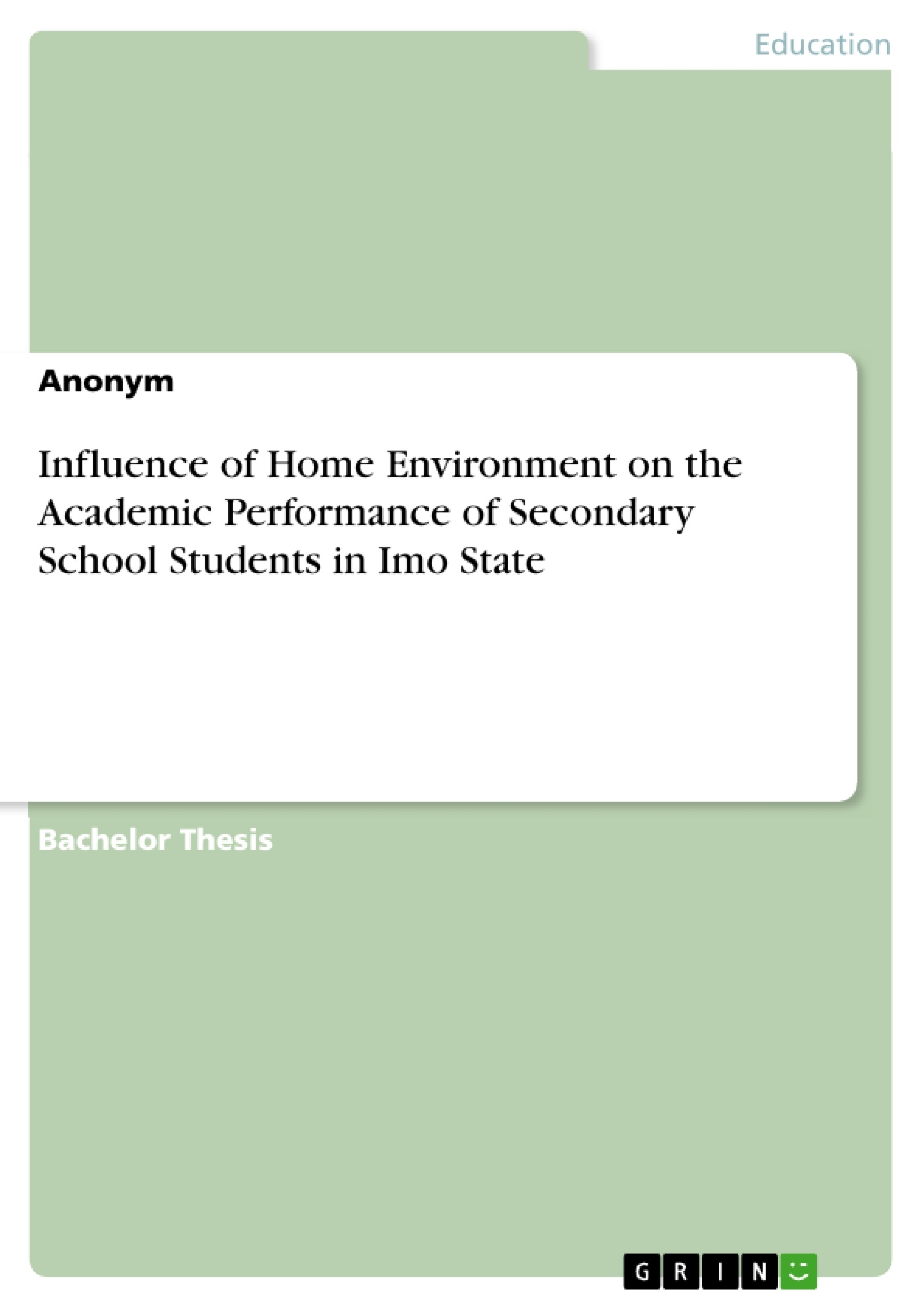The general purposes of this study is to find out the influence of home environment on study academic performance. Specifically, the study sets out to examine the influence of parental occupation on the academic performance of secondary school students in Owerri metropolis of Imo state. It tries to find out whether the size of the family to which they belong affect the students academic performance in Owerri metropolis; and to determine the extent to which type of family would affect the academic performance of students. This study will be delimited to government owned secondary schools in Owerri. Municipal of Imo state Nigeria.
Over a period of time, it has been observed the students who are exposed to the same lesson by the same teachers are likely to perform differently when they are evaluated.
According to Fagbamiye, the board education or ministry of education world wide suspected teaching methodology and classroom teachers as being the cause at the problem yet it seems to persist. This shows that outside the school environment, students are faced with other factors that influence their academic performances. There is also clear distinction between the gifted children and others, but even at that there are factors that influence the academic of both gifted and non-gifted children which can not be traced to the school environment.
Table of Contents
- CHAPTER ONE: INTRODUCTION.
- 1.1 Background of study
- 1.2 STATEMENT OF PROBLEM.
- 1.3 SCOPE OF THE STUDY..
- 1.4 PURPOSE OF THE STUDY.
- 1.5 SIGNIFICANCE OF THE STUDY.
- 1.6 RESEARCH QUESTIONS.
- 1.7 RESEARCH HYPOTHESIS..
- CHAPTER TWO: REVIEW OF LITERATURE..
- 2.1 THE CONCEPT OF HOME ENVIRONMENT
- 2.2 FACTORS WHICH MAKE UP “HOME ENVIRONMENT”
- 2.3 MEANING AND CONCEPT OF ACADEMIC PERFORMANCE
- 2.4 EMPIRICAL REVIEW OF STUDIES.
- 2.5 SUMMARY OF LITERATURE REVIEW
- CHAPTER THREE: RESEARCH METHOD
- 3.1 RESEARCH DESIGN..
- 3.2 AREA OF STUDY
- 3.3 POPULATION OF THE STUDY..
- 3.4 SAMPLE AND SAMPLING TECHNIQUES.
- 3.5 INSTRUMENT FOR DATA COLLECTION....
- 3.6 VALIDATION OF INSTRUMENT..
- 3.7 RELIABILITY OF THE INSTRUMENT.
- 3.8 ADMINISTRATION OF INSTRUMENT
- 3.9 METHOD OF DATA ANALYSIS..
- CHAPTER FOUR: PRESENTATION OF DATA ANALYSIS AND RESULT......
- 4.1 RESEARCH QUESTION ONE
- 4.2 RESEARCH QUESTION TWO...
- 4.3 RESEARCH QUESTION THREE
- 4.4 RESEARCH QUESTION FOUR ...
- CHAPTER FIVE: DISCUSSION OF RESULT.
- 5.1 DISCUSSION OF FINDINGS AND CONCLUSION
- 5.3 SUMMARY AND CONCLUSION
Objectives and Key Themes
This study investigates the influence of home environment on the academic performance of secondary school students in Imo State. It aims to understand the impact of factors within the home environment on student achievement and to explore possible strategies for improving educational outcomes.
- The concept of home environment and its influence on academic performance.
- Factors that contribute to a conducive home environment for learning.
- The relationship between family size and academic performance.
- Empirical studies examining the influence of home environment on educational success.
- Recommendations for improving the impact of home environment on student performance.
Chapter Summaries
Chapter One introduces the research topic, outlining the background, statement of the problem, scope, purpose, significance, research questions, and hypotheses. Chapter Two delves into a review of relevant literature, examining the concept of home environment, factors contributing to it, the meaning and concept of academic performance, and previous empirical studies. Chapter Three presents the research methodology, detailing the research design, study area, population, sampling techniques, data collection instruments, validation and reliability of the instruments, data administration, and analysis methods. Chapter Four presents the data analysis and results, exploring the findings based on each research question.
Keywords
The key terms and concepts investigated in this study include home environment, academic performance, secondary school students, Imo State, family size, empirical research, educational outcomes, and recommendations.
- Arbeit zitieren
- Anonym (Autor:in), 2019, Influence of Home Environment on the Academic Performance of Secondary School Students in Imo State, München, GRIN Verlag, https://www.grin.com/document/507988



